‘’As soon as I saw you, I knew an adventure was about to happen.’’ – Winnie the Pooh
Setting out on an adventure with friends might sound like the ideal getaway, but many have experienced the disappointment and challenge of being out in the wilderness with a group of people who have widely differing expectations, physical fitness, or mental resilience. Sometimes your best friend might not really be the right person to team up with on a challenging adventure. Here are a few aspects to consider when choosing a team.
Experience
Define the physical capabilities and skills required for your chosen adventure. If it is land or water related, what are the key skills each of you will require? Be realistic about the number of hours you will be active and the distance you will cover each day on your expedition. Is previous experience necessary or can some of the required skills be learnt in the lead up to the trip? There needs to either be a minimum set of skills or experience defined as an entry point, or an understanding that those joining the team will work up to this level during the training, and report on their progress so you all know what level you are at before you head out on the ultimate adventure.
Expectations and goals
Taking on a multi-day adventure or a challenging wilderness expedition as a team, requires focus on a goal. Define the goal from the start. Are you all in it for the “time” it takes to complete the route, and if so what is the goal? Or are you in it merely for the enjoyment of the journey, and if so, finishing together becomes the goal. Each of your team needs to be on board with the goal from the start and may need reminding of it during training and preparation.
One of the best ways to work out if you are all on the same page, is to get together and complete a fairly challenging training session together, that lasts more than a few hours, perhaps even overnight. It will quickly become apparent who is more interested in the time, versus those who nurture the team and stick together to reach the end, no matter what.
By its very definition, adventure is “an unusual and exciting or daring experience.” If everyone in the team accepts that each day will bring unexpected challenges, but that this is what gives us those unforgettable experiences together, then you are off to a good start!
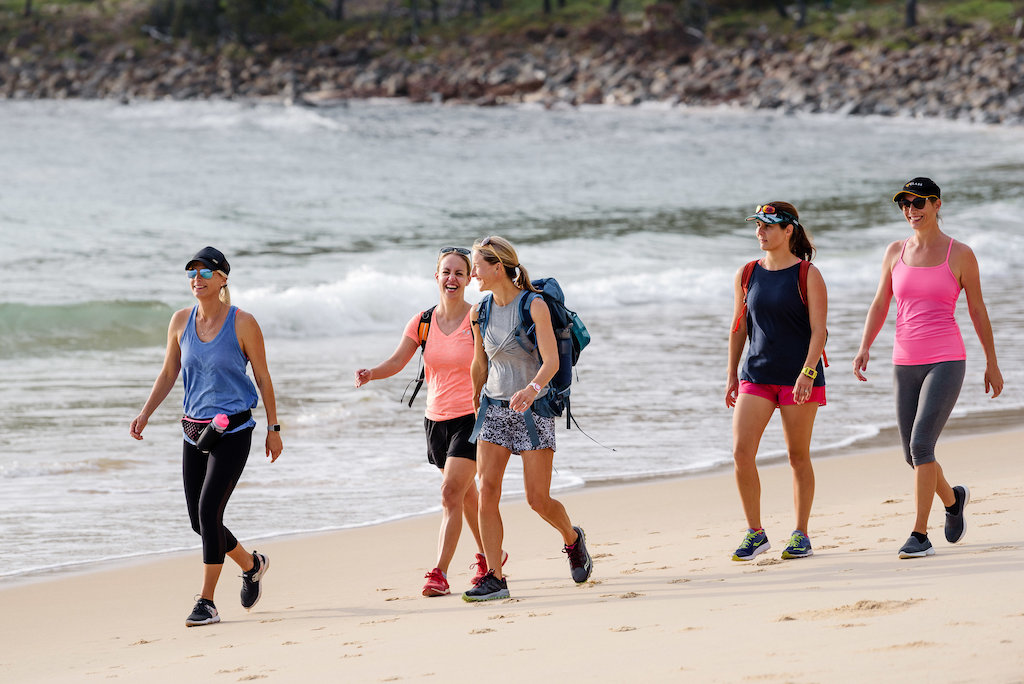
Lisa training on Noosa Beach – Swirltography
Pace
Training together will also highlight if there are any major differences in pace between the members of the group. Certain pace differences can be tolerated, but over many days and larger distances or in challenging terrain, these are amplified and cause frustration for those who want to move faster and feel the need to pull away, and those at the back who are expending greater energy just trying to keep up and feeling like they are letting down the team.
Most people have a natural tendency to move at a certain pace. Weigh up whether there is a large difference in the natural pace of the individuals, or if this gap is more of a fitness level issue. If there is a large difference in fitness or physical capacity, then a training plan needs to be put in place to help each team member to reach the required level at which you can all cover the distance together, without the team splitting far apart. On the other hand, in situations such as altitude, or where you may be in pairs in a kayak for example, you may decide that the group will travel apart for some periods. As long as there are clear navigational instructions, communication and points to regroup at, this can work.
Shared appreciation for the magic of nature
Spending time out in the wilderness, in remote locations, gives us the opportunity to enjoy the many benefits of immersing ourselves in nature. For some, the quiet, the exposure to extremes of weather, the simplicity of eating meals out of your mug whilst sitting on a rock, might sound like heaven. To others, this combination can take them so far out of their comfort zone that they hate every minute of being out there.
The very nature of adventure requires that at some point, you will endure less comfort than you would usually in daily life. But for those that can put up with this, the exhilaration of being out in the wild, with access to stunning vistas, is enough to outweigh the lack of creature comforts. This is a key point to discuss with your potential teammates. What capacity do they have for simplicity, for making do with the very basics, and for being able to adapt to constantly changing conditions, weather and other unexpected challenges along the way? Do they have any big fears or phobias that might limit them? If so, can these be overcome and do they have the resilience to keep going when the going gets tough?
Do you share an appreciation for nature and preserving it along the way? Agreeing on how you “Leave No Trace” is another important topic to cover off together.
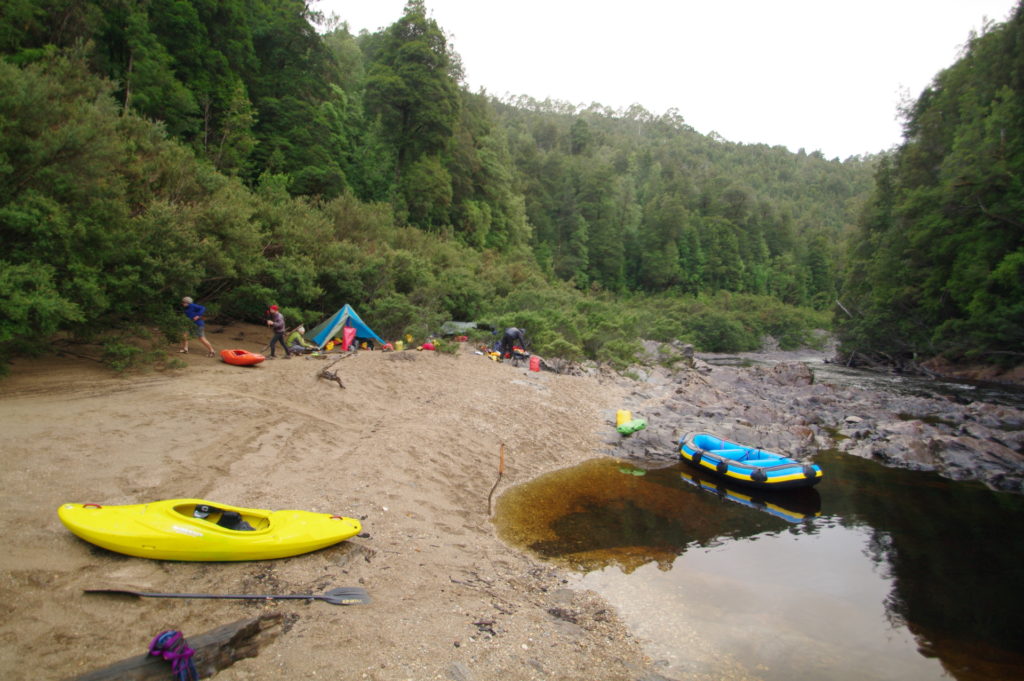
Temperament
There are those that prefer to lead, and those that would most like to follow. Sometimes there are people in between! Team dynamics can play a big part in the way you all make decisions along the way, or resolve issues when plans need to change. There is always an opportunity to learn about yourself and how you manage difficult situations in the wilderness, when tired, hangry or in extreme temperatures!
When bringing a team together, it is worth looking at the different temperaments and styles of leadership or teamwork that each person prefers. This is a tricky one, and you will only start to discover these preferences by spending time together out training. A simple set of values and an agreement on open communication between the team, can be a starting point for diffusing “power struggles” or differences in opinion that will no doubt arise along the way. A shared appreciation for supporting each other through the tough times and providing a team culture that allows each person to “push the limits”, might be some of the values you discuss and adopt together.
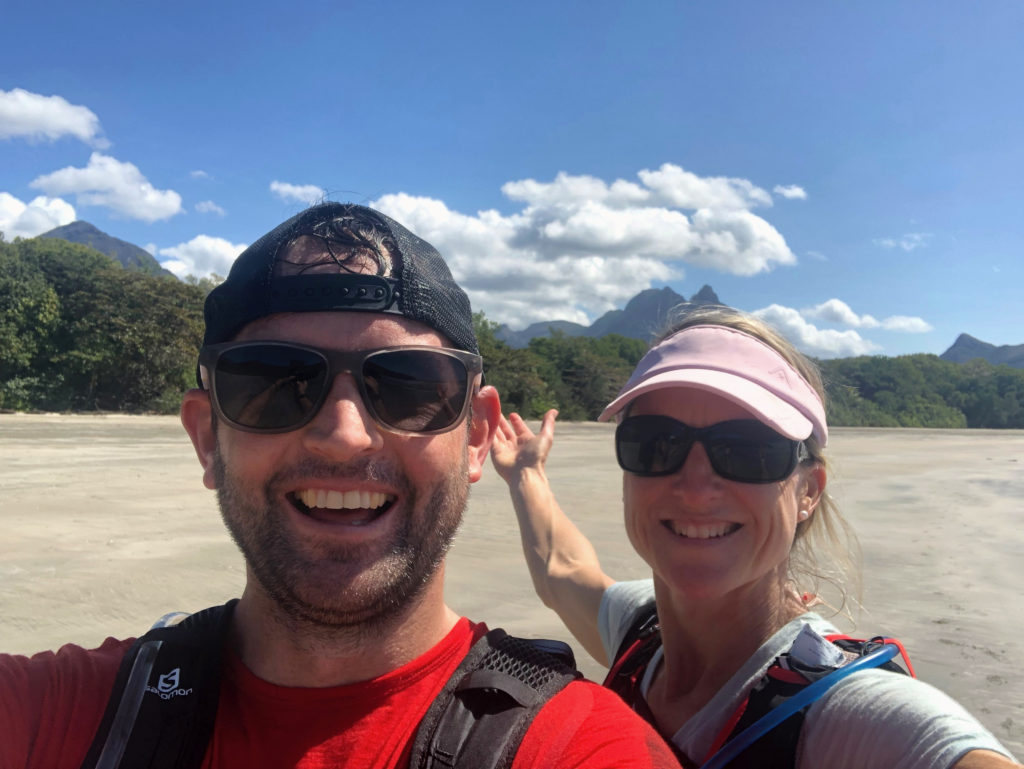
Adventure soulmates
Sharing an adventure with a group of people also brings with it the opportunity to make lifelong friends. The strong connections forged between people who share adventures or overcome challenges together, is well documented. There are special bonds created between people who find themselves out of their comfort zones, and away from the distractions of modern life. A well-matched team will cherish the memories of that adventure and relive them together for many years to come, forging the way for more exciting adventures in the future. You will know when you’ve found your adventure soulmates, because you’ll be planning your next adventure together before the current one has come to an end!
Lisa interviewed Sarah Lees-Barton, a serial adventurer who can be found out and about on kayaks, hiking, horse riding, trail running or mountain biking all over Queensland, NZ and beyond, to hear her thoughts on finding adventure soulmates.
Sarah is an expert in gathering people together for outdoor adventures. She is also a mum of three, a teacher, permaculture expert, naturopath, and has travelled worldwide and taken on many outdoor expeditions.
In training for the XPD Adventure Race this year, held in Cairns, Sarah signed up for this huge goal last year with another adventure buddy of hers and then went about recruiting a team of women to share this (crazy?) adventure with her.
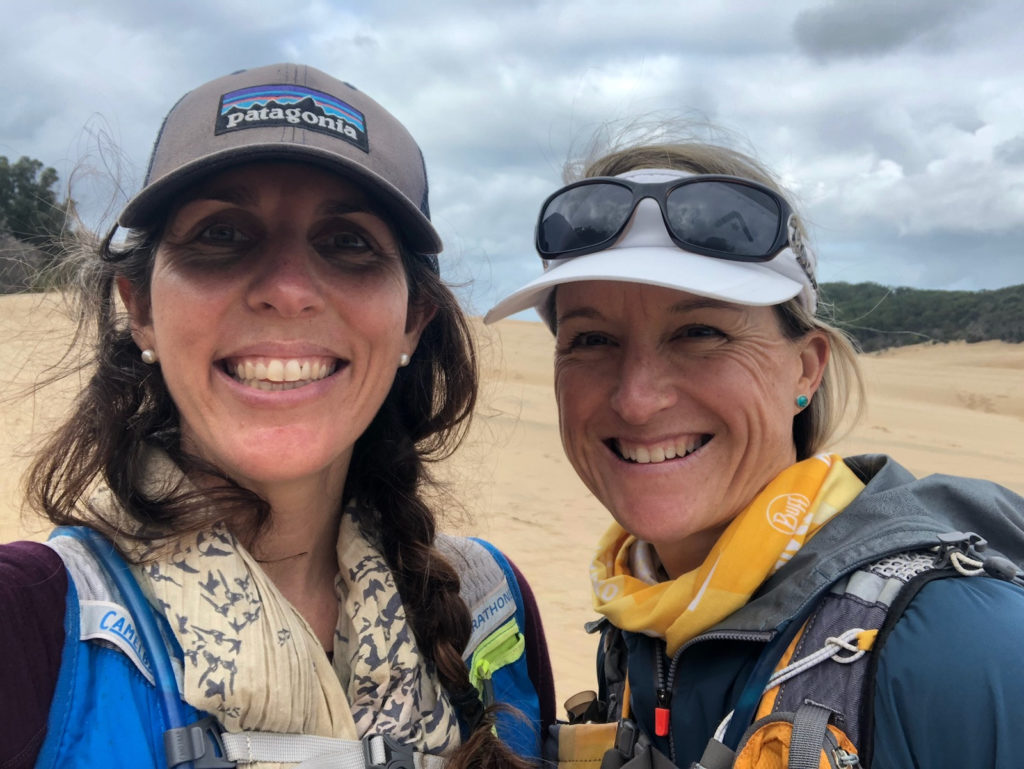
Sarah, how do you know when you have found your adventure soulmates?
A: It just feels right…….
B: The conversations (silences even) flow easily and you generally love spending time (and look forward to adventures) with these people (even though they may be very different from you).
C: Organisation, logistics and planning of adventures is an exciting and inspiring time and you look forward to all of the aspects of adventure together.
D: You love hearing the adventures and life stories of the people you adventure with. They inspire you and you admire many aspects of these people’s personalities, values and gifts.
And most importantly (in my world), you laugh a lot and every adventure, no matter how big or small, leaves you feeling tired, happy and looking forward to the next one!
What is your definition of an adventure soulmate?
An adventure soulmate is one who would be willing to “coddiwomple” with me… which means to set off on an adventure with a un yet known destination and they are happy to give anything a go, not care about the destination but the journey itself. That to me is the perfect adventure buddy.
What criteria do you look for in someone when seeking out teammates for an adventure?
- They have to be easy going, flexible and allow others to do things their own way.
- Non-competitive (this is specifically related to my teams as we are in it for the journey.)
- Endurance over speed.
- Willing to be out of their comfort zone for both short and long term adventures.
- Someone who looks forward to, and is interested in personal development.
- Is not scared of pain, as there is always an element of injury or risk with adventure and fear of pain can often prevent someone from enjoying the experience or giving up.
- Must like to laugh, chat, laugh at themselves.
- Ability to be honest and communicate clearly. This is possibly the most crucial as ineffective communication can the downfall of many teams. Have good team roles and good communication, without getting defensive or critical.
- Worldly – interested in the world.
What are some of the deal breakers or issues you have experienced with teammates in a group out on an adventure, that you think are potential “red light” warnings to look out for?
- Inflexibility. The need for something to be done a certain way or the need to control everyone and everything.
- High levels of competitiveness or wanting to push the team all the time.
- Passive-aggressive people who talk at you and not with you.
- “Know it all’s”… bossy people, can be very difficult when the going gets tough.
- Someone who never apologises.
- Low levels of emotional resilience and endurance (the ones who constantly whinge and cry at smallest things or want to give up early on.)
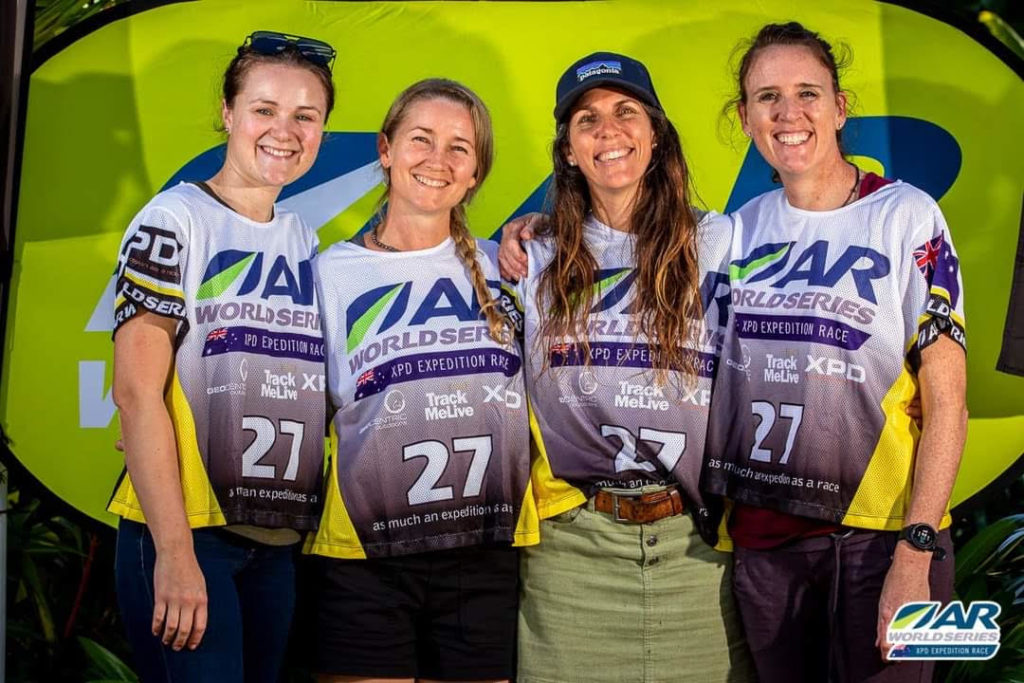
What qualities do you think draw people to wanting to adventure with you?
With me it’s always an adventure…. people love that it takes them out of their normal world and they can let go and come into a different world.
An element of fun and sense of adventure and a very easy-going personality.
Willing to give everything a go and never gives up.
I’m organised, resilient, capable and have skill levels that allows for a certain peace of mind that I will have everything covered (first aid, nutrition, etc)
I have an ability to make light of situations and look on the bright side of life which can be inspiring for some.
Besides personality traits and energy, what other skills or experience do you look for in an adventure soulmate? Which of these are non-negotiable, and for which can you allow some time and space for growth and development?
Non-negotiable:
- Emotional resilience and ability to own their own s*** and work through their own issues without projecting onto teammates.
- A sense of adventure and willingness to give everything a go.
- A love for the outdoors and being in nature (in all her glory).
- A certain level of physical fitness (not a first timer, but someone who has kept fit most of their lives) and a basic level of knowledge on outdoor equipment and looking after themselves in the wild.
- Someone who has been on adventures of some sort (hiking adventure, years of travel, competitions of some sort).
- A skill that can be utilised within the group, whether they are a great organiser, a first aider, an expert in knots or some skill that can contribute to the team effort.
Time and space for growth and development:
- Developing a new skill (such as kayaking or mountain biking, first aid, navigation) if they haven’t done that modality before as that’s part of the fun… learning new skills.
- Building fitness and learning about how your body works and what it will need.







